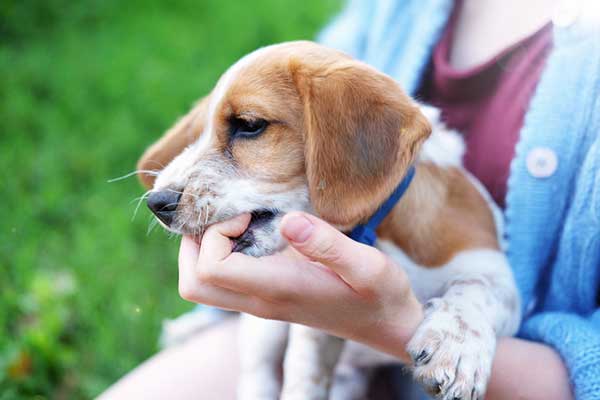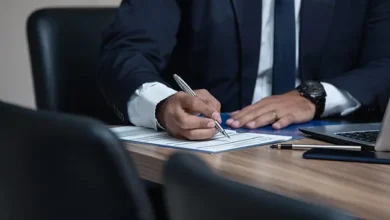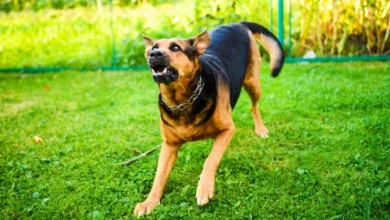
Most of you dog parents often face the question: “when do puppies stop biting?” then the answer most likely comes to: “Not soon enough!”
Normally, a puppy naturally begins to decrease biting at around four or five months of age. But you need to handle this case carefully, please keep reading to do that perfectly.
Read More:
- What Happens If Your Dog Bites Someone
- 6 Things You Must Do If You Are Bitten By A Dog
- 3 Things That Might Make Your Landlord Responsible For Your Dog-Bite Injury
- 10 Tips to Help Prevent Flea Bites on Dogs
- Bitten by a dog? Here’s What You Should Do Now
You will find that getting bitten by an 8-week old puppy can be quite painful and enough to upset you quite a bit. This is mostly due to the fact that you don’t actually expect your prized companion to bite you.
Soon though, you will learn that this is just a phase in every puppy’s life. So in this article, we will discuss a few tips that will help you get through this tiny little friend’s bitey phase.
We will also discuss a few reasons which trigger the biting in puppies and how you can get along with your puppy better during this time.
When Does the Biting Usually Start?
Usually, around the time the puppies are 3 to 4 months old, they start the teething. Puppies will bite mostly because they are teething, but sometimes they will bite because they want to play. As the puppies get to about nine weeks old and they settle in well in their new home, they begin the biting in earnest.
The good news is that, by the time your puppy has its full set of grown-up teeth by the time they are seven months, it will tend to stop biting.
You can also stop your puppy from biting much earlier before it has all its adult teeth cut. That is what we will discuss further in this article.
My puppy bites a lot
Many pet owners often worry that their puppy bites more than is normal, that too mostly they are biting the children. It is natural for the parents to get very concerned if they see their children welling up in tears when playing with the puppy, and the reason for it is the bites from the puppy.
After all, no one will blame you if you start reconsidering your decision of bringing a puppy home if it starts to chase your three-year-old all around the house with the intent to bite.
If you find your child teary-eyed a lot due to the bites from the puppy, it might dawn on you that the puppy is getting aggressive.
You may start to worry if your child is at risk from your puppy; fortunately, that isn’t the case.
Your child might get frightened by the growing and sharp teeth the puppy shows, but it really isn’t a threat to the child’s safety.
Many breeders won’t sell puppies to homes that have kids because puppies are known to bite smaller children harder than they bite grown-ups.
Many children can give off signals to puppies that might be conflicting. Many puppies misinterpret these signals and might go to bite your kids.
You need to be patient, and as you know that this phase will pass quickly.
is my puppy too aggressive?
It’s true that puppy bites hurt a lot, occasionally leaving marks. Getting tooth marks on your child, scratching, bruising, pain, all of these are part of the package of bringing a puppy home. Sometimes there might even be a little blood.
So how much of it is actually normal? A puppy will practice being fierce when it plays. Your puppy will try to scare you by making itself seem and sound fierce.
The bigger part of the game for them is to make as much noise as possible and seem as much angry as it possibly can.
So it’s all a part of the game for them when they snarl and growl ferociously; all they are after is to get you to start another game.
The puppy won’t just sound fierce; it will look the part too, getting its face all scrunched up and showing all its teeth.
Your puppy doesn’t realize that it might not all be just a game for your children, and they might actually get very frightened by it.
But you need to remember that your puppy is just playing; it is just a game for it, no matter how ferocious it looks or sounds.
What is Normal puppy play behavior?
All puppies will bite; you just need to make your peace with it.
They’ll chew on your hand while you’re petting them, or gnaw at the air near your feet as they tug ferociously in a playful game of “keep away.” And if it hurts? It means their teeth have come out!
Puppy bites can be so hard that they might even break your skin. They bite your hands, at your bare feet, and even tug at your clothes, sounding as fierce as they can. Naturally, you should be wondering when all the biting stops?
What Makes the Puppy Bite More?
The good news is, you don’t really need to play a lot with your puppy to make its biting stop. The biting will naturally go down as they get around 4 to 5 months old.
This happens more so in families where there are one or two adults who have experience with puppies and don’t really need to give an active training session on not biting.
This is also a common scenario in homes where the parent needs to go to work, and the puppies are mostly kenneled, having minimal interaction with people other than the owner or the trainer.
A good way to stop puppies from biting would be to minimize interaction and refuse to play.
However, in families that have a few young members, it’s tough not to play with the puppy physically.
The puppy gets really worked up and agitated due to this, and ultimately the biting gets worse.
There are many puppy owners who make the biting worse by rewarding the puppy by paying more attention to it when it bites.
When Do Puppies Stop Biting?
Even if you do nothing, your puppy will naturally begin to decrease biting at around four or five months of age. This is because in families where there are just one or two adults that know what they’re doing and have experience handling puppies without getting them worked up during these early stages of development it tends to happen by itself.
The more you play with your puppy the less likely they are to bite!
It also happens in families that have working dogs. Sometimes, the dog is not allowed to play with people other than its trainer or caretaker. A study about guide dogs showed that they stopped biting their puppy walkers if they just refused to interact or play with their puppy.
But this doesn’t happen in all families. In some families, everyone plays with the puppy, and it is a novelty. Sometimes this is done physically. Puppies may start to bite because they get excited and don’t know how to play nicely yet.
Puppies can also get very excited and make biting worse, so they should stop playing that way if they want to fix it.
But if someone does not change their behavior, then puppies will think that biting will get the attention of owners who play with them like that.
how to train a puppy not to bite?
Below we have discussed a few steps that can help you to make things better with your puppy.
Separate and Supervise
The first thing that you need to do is to separate any children that come to play with your puppy. We all want our children to get along with the puppy, but when it is teething, you just need to keep them apart to protect them.
If your child is under five months and your puppy isn’t four months old, there is a high possibility that your child might get bitten by your puppy. This is why any sort of interaction between them needs to be carefully supervised by you.
Furthermore, you cannot allow your children to take the puppy up to their room. You can put baby doors across the doors if even it is not required for your children anymore.
This way, you can separate your children and the puppy if you are not around to supervise. You also need to teach your child how to stroke the puppy gently while you hold it. You need to make sure the puppy doesn’t get excited by your child and that your puppy doesn’t get to chase around your squealing child.
Bite Inhibition
A Labrador puppy’s bite can actually pack enough punch to crush the bones that have the thickness of your little finger.
But the puppy doesn’t want to break the skin when it bites, let alone break your fingers. This process is called “Bite Inhibition.”
meaning how your puppy has learned to inhibit its bite since it was very young.
The puppy’s parents and siblings have taught it how to bite hard without actually hurting.
The thing is that the puppy’s mom had a nice thick coat which, unfortunately, you don’t have.
But the puppy is not aware of the difference; hence it’s important for you to provide training to your puppy to teach it just how much force is acceptable.
The staged bite inhibition training will help your puppy gain total control over the force it applies while biting in the future.
How About Teething
Many people associate teething with biting, so it leads them to wonder if their puppies are biting so much as they are teething.
They also wonder how long the teething will last. In most homes, the puppies mostly mouth or chew at fingers to relieve the discomfort that they are facing from teething.
The puppies mostly play biting; the snarling and the tugging is associated with that as well.
The good news is that most puppies usually have their adult teeth by the time their age reaches seven months old, and usually, the biting stops long before that.
Between 9 to 10 weeks old, the bite of your puppy isn’t quite that powerful yet, but the teeth are still pretty sharp.
You might think that a small puppy’s bite won’t hurt as much, the reality is they grow pretty fast, and by the time they are 12 weeks old, you will really start to feel the pain from the bites. So it is best that you waste no time and act fast.
Mind the Visitors
It’s not only children who enjoy playing with a puppy; lots of adults like to grapple a tiny puppy too, playing around with it while it gnaws away on the adult’s ankles.
The adult might be more adept in handling the teething bites from the puppy, but the same can’t be said for your toddler.
So be sure to request your guests to be mindful of the situation, observe and supervise them at all times, and if your visitor refuses to be calm around the puppy, just separate the puppy by putting it in the crate till your gregarious guest leaves.
Enjoying your Puppy While Keeping Sane
Of course, you want to have a great time with your family and the puppy, but it might be harder than we think. Maintaining your sanity with a teething puppy at home can be quite hard, and separation and supervision will go a long way to ensure your sanity while still having a blast with the puppy.
The key is to teach the children how to not get the puppy overwrought by interacting minimally with it. Puppies tend to get silly as they easily get over-excited. This will change as soon as the puppy learns how to control its biting.
Should you Punish your Puppy?
Many people resort to smacking the puppy or shouting at it to stop it from biting. There are a few problems with this.
Firstly, it will only stop the puppy from biting you, not your children.
Secondly, your puppy will associate the punishment with an unpleasant event with you involved, creating problems for training like recall later on.
You don’t want your puppy to be scared of you, ruining your friendship. It might also cause aggression in your dog’s life later on.
Training the Puppy to Not Bite
When you play with your puppy, let him put his mouth on your hands. Continue to play with him until he bites really hard. When he does, immediately make a high-pitched yelp like you are hurt and let go of your hand. Do this until he stops mouthing you. Dog trainers call it “play biting .”
The Bite Inhibition Training
This is the training where you teach your puppy how it can bite gently on your skin. This training does take time as it is taught in stages. It teaches the puppy to gradually reduce the strength of its bite, as well as not to mouth at human skin at all. You need to instantly divert your attention if your puppy bites and hurts you. Installing a baby gate will enable you to step over the gate when your puppy bites, effectively removing all the attention from it.
Many puppies will stop biting if you squeal or yelp. However, there are some puppies who might get more excited by your squealing, while with some puppies, there will be no effect at all. The best way to send a signal to your puppy to stop is by removing your attention or presence.
You should teach your puppy not to bite. If they do, then it will be “game over”
If your puppy bites you, it means that playtime is over. If you yell at or hit the pup, it teaches them that biting gets a response from you, which is called positive punishment. This can make them fearful of being handled. Instead, do nothing when they bite and teach them biting doesn’t get anything in return (negative punishment).
I learned this from Kathy Santo, a dog trainer who writes for the AKC Family Dog Magazine.
It’s actually a calming signal and a minor form of attention withdrawal,” she says. “And be careful not to roughhouse with your young pup in ways that only encourage them to lose control and bite you.
– Kathy Santo
give them an alternative item to chew
When your puppy bites, give them an alternative item like a chew toy to bite on. You should always have one on hand and be ready for when your puppy starts biting.
If they start biting your hands or furniture, you can give them the toy instead.
If they keep doing it, stop playing with them right away. It might also help if you train your pup to sit before giving them the toy as a reward.
stop your puppy from jumping on walks?
If your puppy is jumping on you when you walk, a playful behavior, I recommend that you hold a high-value treat next to your leg as you walk. This will help the puppy learn to walk nicely alongside you. The same tactic can be used when teaching the pup to walk on a leash.
Try to Keep your Puppy Calm
You have to remember that you have to keep your puppy as calm as possible. You have to cut off the game as soon as you realize that your puppy is getting too excited, and you need to stop rewarding the puppy when it bites. Especially refrain from giving it any attention when it bites you or someone else.
Reinforce behaviors you desire
When our puppy is calm and quiet, we should do something nice for them. We could say “good dog” or give them a piece of kibble or a pat. This will teach the puppy what behavior we want it to do.
Enroll in a puppy class
Find an AKC S.T.A.R Puppy class or other well-run local classes for your puppy to socialize in with other dogs and people. Teaching your little pup to be polite with their mouth may seem like a huge challenge at first, but patience and consistency are the keys to success!
Wrapping Up
Among the stages of development for your puppy, biting can be a very painful and frustrating stage. But you need to remember that your puppy is just playful, no matter how hard it bites or how fierce it sounds. So you need to be patient and take expert services such as puppy pre-school classes that use force-free training methods to help you through this stage. Have fun and a happy time with your furry friend.
Read more:



